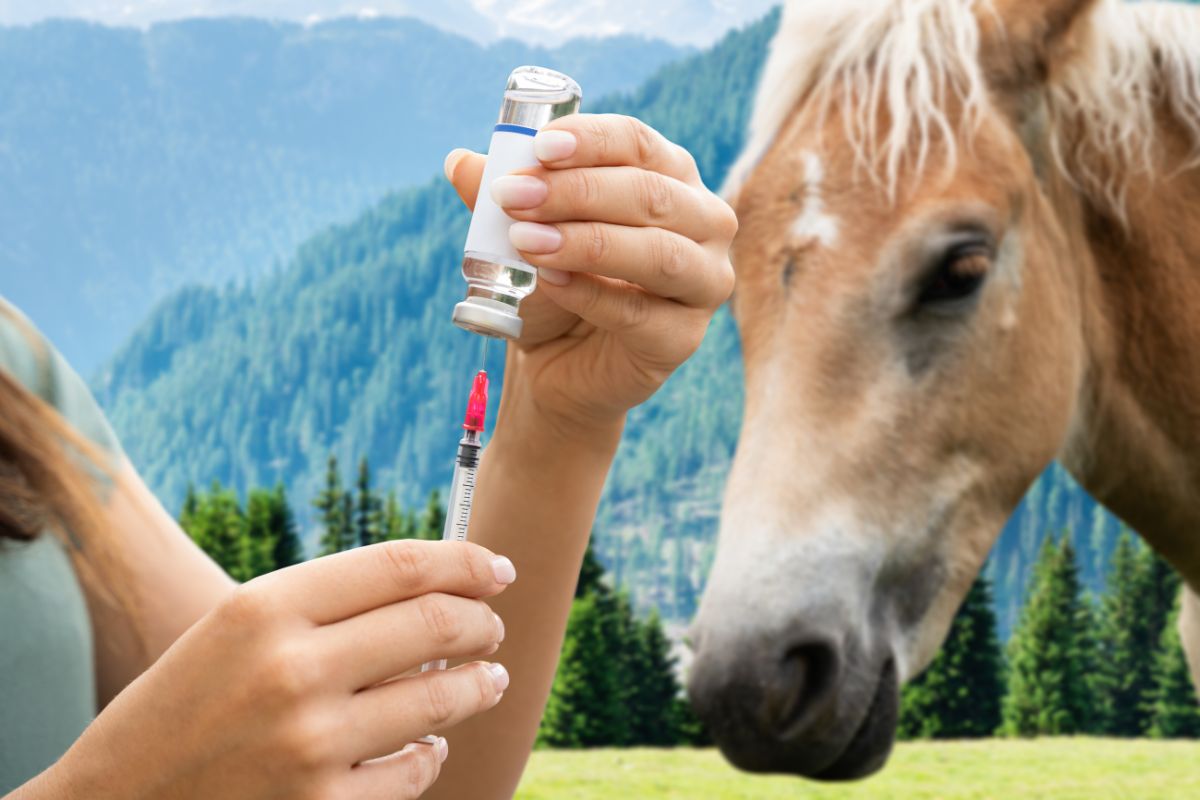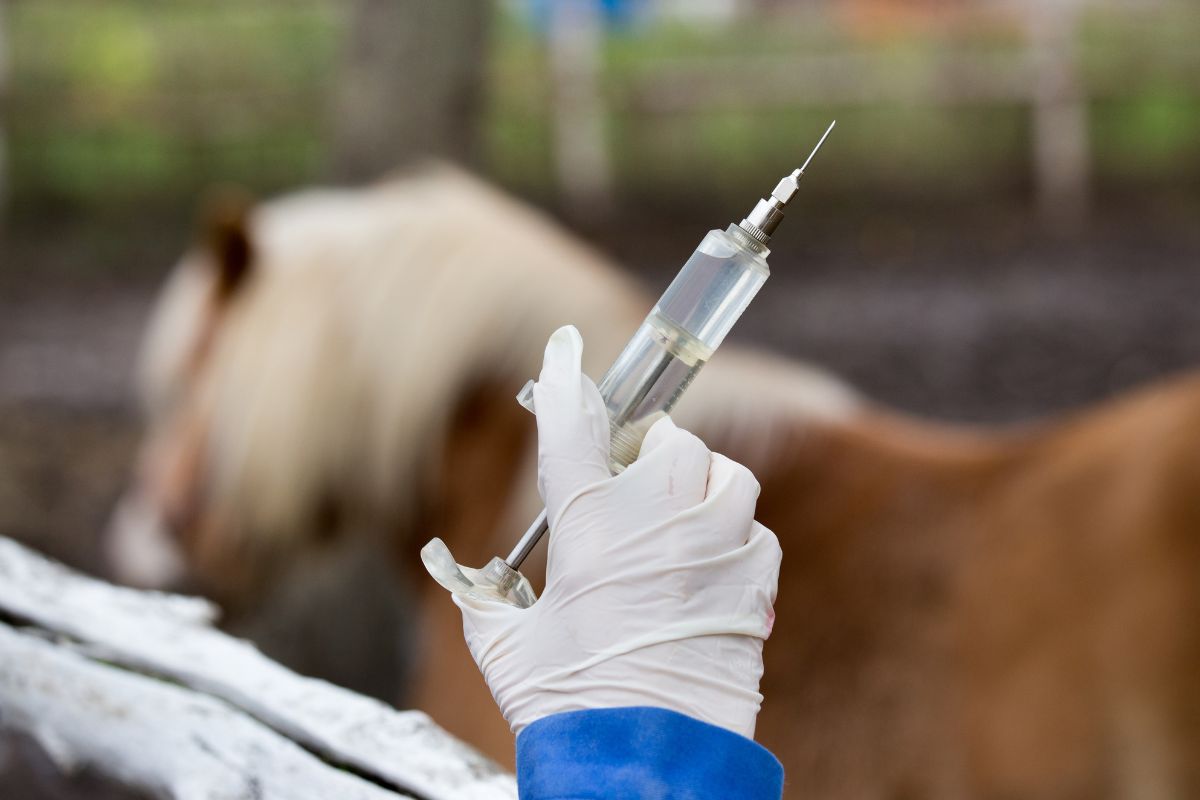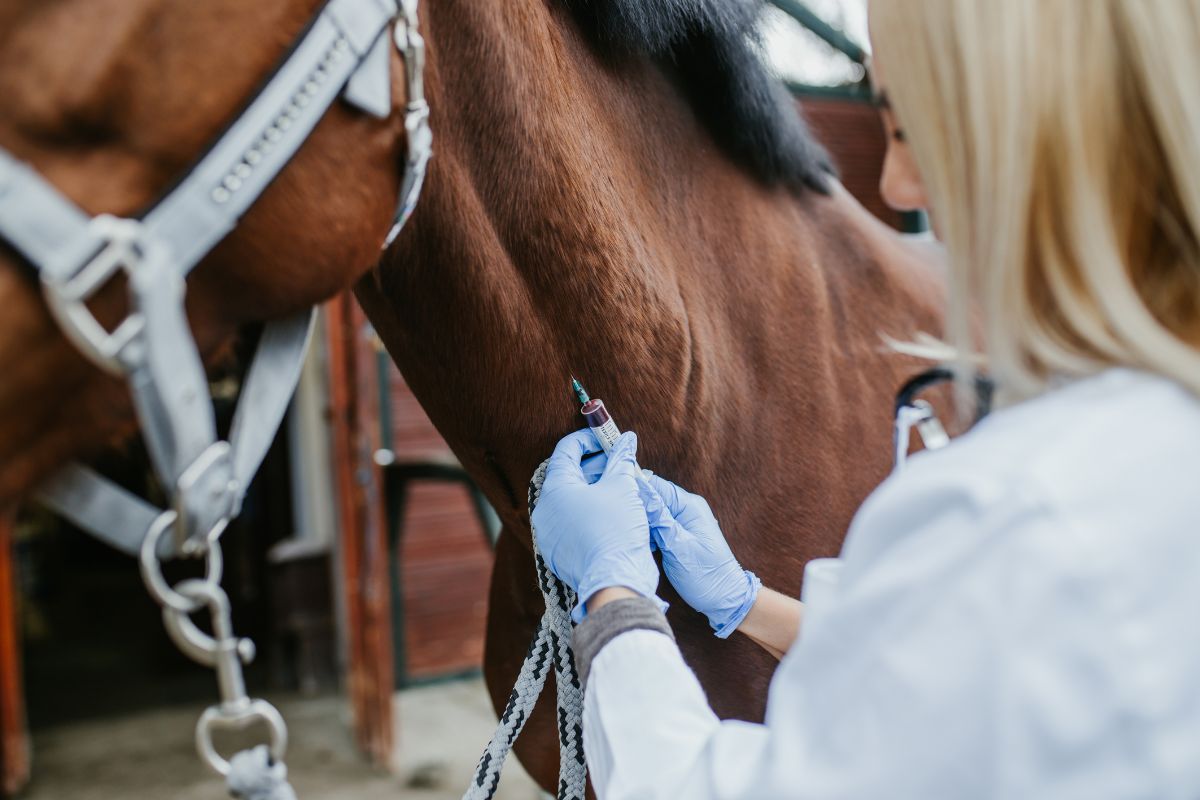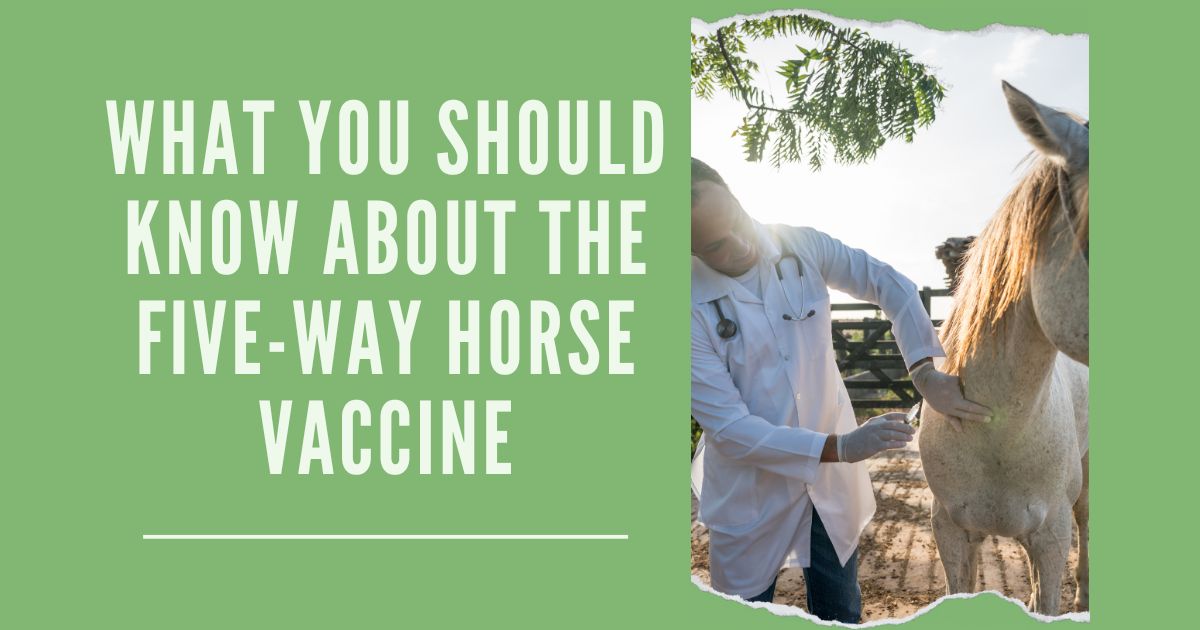Horses and Vaccines
Horses are herd animals which means they get exposed to groups of animals that may carry diseases. That’s why we use vaccinations like the five-way horse vaccine to prevent them from getting sick or protect them from severe forms of illness.
Horses spend most of their time outdoors, exposing them to many pathogens like bacteria and viruses in the environment or spread by insects.

Why are Horse Vaccinations Needed?
The adage that prevention is better than cure best represents the principles behind why we vaccinate horses.
A vaccine is a biological product engineered to introduce a pathogen to the immune system so the horse can develop immunity against the disease. Immunity is a training program the body goes through to equip it to fight off any future infections.
A vaccine only works prophylactically and cannot be administered if an animal is already sick. Vaccines help to prevent dangerous and deadly diseases by arming the body’s defenses before they face any pathogens, like a training program before going to war.
The different types of vaccines include:
- Live attenuated vaccines: this vaccine has a live version of the virus or bacteria that has undergone a process to weaken it so that it produces milder disease symptoms. A live attenuated virus achieves an adequate immune reaction, but in immunocompromised animals, the attenuation may not be enough to avoid a full-blown infection.
- Inactivated (killed) vaccines: these vaccines do not contain the live pathogen; only the biological skeleton represents the vaccine antigen.
- Subunit vaccines: a small piece or section of the pathogen elicits an immune response.
- Conjugate vaccines: a conjugate vaccine connects molecules to antigens to create an immune response.
- Toxoid vaccines: this vaccine uses weakened bacterial toxins so that the body mounts an immune response without the bacteria causing any morbidity.
What Vaccines Do Horses Need?
A horse’s vaccination protocol depends on its age, purpose, and the endemic diseases found in its environment.
The American Association of Equine Practitioners (AAEP) Infectious Disease Committee lists the following equine vaccinations as core vaccines administered to horse populations regularly:
- Rabies.
- Tetanus.
- Eastern Equine Encephalitis.
- Western Equine Encephalitis.
- West Nile Virus.
Additional vaccinations administered depending on the risk profile of the horse include
- Equine Influenza.
- Equine Herpesvirus, also known as Rhinopneumonitis.
- Equine Viral Arteritis.
- Potomac Horse Fever.
- Rotaviral Diarrhea.
- Strangles.
How Often Should Horses be Vaccinated?
Horses should receive most of their vaccinations annually. Some exceptions include tetanus vaccinations which require a booster at the time of penetrating injury or prior to surgery if the last dose received was over six months.
Vets may consider a six-month revaccination interval for EEE/WEE in high-risk situations such as a premature onset of seasonal disease and increased viral challenge in the area.
Vaccination Protocol for Horses
The AVMA defines core vaccination requirements as follows:
- Vaccines must protect a horse from diseases endemic to a region with high virulenence or infectiousness that pose a risk of severe disease.
- The vaccines must cover diseases with possible public health implications.
- Law requirements determine core vaccines.
Vaccinations are a great way to protect horse populations from high morbidity and mortality rates due to infectious diseases.
Vaccinations for Foals
| Disease | Foals and weanlings (age less than twelve months) born to mares vaccinated in the prepartum period against the disease indicated | Foals and weanlings (age less than twelve months) born to unvaccinated mare or lacking vaccination history |
| Tetanus | Three dose series: -First dose at four to six months of age -Second dose four to six weeks after the first dose -Third dose at 10 to12 months of age Annual Revaccination | Three dose series: -First dose at four to six months of age -Second dose four to six weeks after the first dose -Third dose at 10 to 12 months of age Annual Revaccination |
| Eastern or Western Equine Encephalomyelitis (EEE or WEE) | Three dose series: -First dose at four to six months of age -Second dose four to six weeks after the first dose -Third dose at 10 to 12 months of age Annual Revaccination | Three dose series: -First dose at four to six months of age -Second dose four to six weeks after the first dose -Third dose at 10 to 12 months of age Annual Revaccination |
| West Nile Virus (WNV) | Three dose series: -First dose at four to six months of age -Second dose four to six weeks after the first dose -Third dose at 10 to 12 months of age Annual Revaccination | Three dose series: -First dose at four to six months of age -Second dose four to six weeks after first dose -Third dose at 10 to 12 months of age Annual Revaccination |
| Rabies | Two dose series: -First dose at four to six months of age -Second dose four to six weeks after the First dose Annual revaccination | Only one dose: -First dose at four to six months of age Annual revaccination |
Vaccinations for Adult Horses
| Disease | Broodmares | Other adult horses (Older than one year) previously vaccinated against the disease indicated | Other adult horses (Older than one year) unvaccinated or lacking vaccination history |
| Tetanus | Previously vaccinated: Annual, four to six weeks pre-partum Previously unvaccinated or having unknown vaccination history: Two dose series: -Second dose four to six weeks after the first dose Revaccinate four to six weeks pre-partum. | Annual | Two dose series: -Second dose four to six weeks after the first dose Annual revaccination |
| Eastern/Western Equine Encephalomyelitis (EEE/WEE) | Previously vaccinated: -Annual, four to six weeks pre-partum Previously unvaccinated or having unknown vaccination history: Two dose series: -Second dose four to six weeks after the first dose Revaccinate four to six weeks pre-partum. | Annual – spring, before the onset of vector season. | Two dose series: -Second dose four to six weeks after the first dose. Revaccinate prior to the onset of the next vector season. |
| West Nile Virus (WNV) | Previously vaccinated: – Annual, four to six weeks pre-partum Unvaccinated or lacking vaccination history: Only vaccinate naïve mares when open. In areas of high risk, initiate primary series as described for unvaccinated adult horses. | Annual – spring, before the onset of vector season. | Annual Revaccination |
| Rabies | Annual, four to six weeks pre-partum OR prior to breeding* | Annual | Single-dose Annual revaccination |
What Does the Five-Way Vaccine Imply?
When referring to equine vaccines, five-way describes one vaccine containing five different pathogens. The five-way vaccine provides protection against five different diseases in a single dose. Combining the pathogens into a single dose vaccine makes vaccination much more efficient and convenient for horse owners and veterinarians.

What is in the Five-Way Vaccine for Horses?
The horse five-way vaccines discussed below protect horses against the following diseases:
- EEE – Eastern Equine Encephalitis.
- WEE – Western Equine Encephalitis.
- Tetanus (tetanus toxoid).
- Equine Influenza (“flu”).
- Equine Herpesvirus (“Rhinopneumonitis,” or simply “Rhino”).
The Types of Equine Five-Way Vaccines
Not all five-way horse vaccines are manufactured the same, and listed below are a few examples of multi-way vaccine brands and their composition.
Prestige 5 + WNV:
Merck manufactures the Prestige five-way horse vaccine + WNV with Havlogen Equine Vaccine. It combines inactivated, concentrated, adjuvanted Eastern and Western Equine Encephalomyelitis Viruses, Equine Herpesviruses (Rhino EHV-1 and EHV-4), Equine Influenza Viruses, Tetanus Toxoid, and West Nile Virus.
Fluvac Innovator 5:
Zoetis manufactures the Fluvac five-way horse vaccine. The vaccine protects against Eastern and Western Encephalomyelitis, Equine Herpesviruses (Rhino EHV-1 and EHV-4), Tetanus, and Kentucky 97, the current A1 and A2 influenza strain.
Fluvac Innovator 5 + WNV:
This vaccine offers protection against the West Nile virus as well as all the other diseases covered in the Fluvac Innovator 5 vaccine.
Why Does the Five-Way Vaccine have “+WNV” on the Label?
The additional annotation of “+WNV” implies a combination of the five-way horse vaccine with West Nile Virus. One vaccine covers six different diseases.
Is the Five-Way Horse Vaccine Safe?
A five-way vaccine does have pros and cons. Although a multi-way vaccine is convenient, it does not elicit as strong of an immune response as an individual vaccine. Research shows that individual vaccines achieve a higher antibody level than a combination vaccine.
If your horse has an adverse vaccine reaction to a five-way vaccine, it is difficult to determine which vaccine antigen caused the reaction. The potential complication means you must vaccinate individually to assess the antigen your horse is allergic to.
There are several principles to follow to ensure the safety and efficacy of a vaccine. Listed below are a few pointers on how you can ensure your horse gets the full benefits of vaccination.
Timing
Owners must ensure that vaccine schedules for each animal happen at the right age, at the right time of year, and in the case of broodmares, at the correct stage of the reproductive cycle.
When purchasing a new horse, ensure that their vaccinations are up to date, and if you are unsure, it is best to boost any primary vaccinations. Boosters ensure that they can still mount an appropriate immune response if the animal is naive to the endemic disease.
Plan ahead before shows or events and ensure your horse has adequate time to mount a proper immune response and rest before exposure to a group of horses from various backgrounds.
Herd Immunity
Herds of horses need regular vaccinations to ensure the herd maintains a level of immunity that poses a low risk for disease transmission.
Administration and Cold Chain
A veterinarian should ideally administer any vaccine as they receive training to determine the right protocol, deal with side effects, and be responsible for the quality control of the vaccine. Strict cold chain protocols imposed in vet practices and during fieldwork ensure your horse receives the best shot at a healthy level of immunity against diseases.
Do Equines Need Booster Shots?
Booster vaccine frequencies depend on the horse’s overall health, purpose, and endemic disease challenge. Most vaccinations require a second or third booster after the first shot or an annual vaccination.
Side Effects Related to the Five-way Vaccine
The American Association of Equine Practitioners lists the following side effects associated with the five-way horse vaccine:
- Intramuscular injection site reactions result in local muscular swelling or pain.
- Transient and self-limiting symptoms include fever, lethargy, or depressed appetite.
- Severe injection site reactions resulting in myositis are more challenging to treat and require prolonged treatment and rest.
- Severe reactions with systemic symptoms such as hives, purpura haemorrhagica, colic, or anaphylaxis are rare. A veterinarian must treat these symptoms as soon as possible to avoid mortality.
What to do When Your Horse Shows Symptoms of Vaccine Side Effects
Owners need to monitor their horses for adverse vaccine reactions and inform their attending vet as soon as any issues develop.
The vet will decide if they need to assess the horse in person or if they can prescribe medication over the counter. After evaluating the side effect severity, the vet determines the best course of action to alleviate any symptoms.
Severe reactions require rapid response and a team of vets and nurses to help control the possible hypersensitivity reaction. Ensure your horses are monitored closely and not worked after they receive their vaccinations.

Final Thoughts
Vaccinations prime the immune system to respond swiftly when a horse becomes exposed to an infectious agent, and they are crucial to disease control and prevention.
five-way horse vaccines offer convenient and efficient delivery of multiple antigens in a single dose. By following vaccination protocols, owners give their equine companions an upper hand against disease. Vaccines help to protect horse communities from high morbidity and mortality rates.
Caring for your horse means taking all the precautions possible to put their health and welfare first. Read our article and find out What is Equine Metabolic Syndrome?
